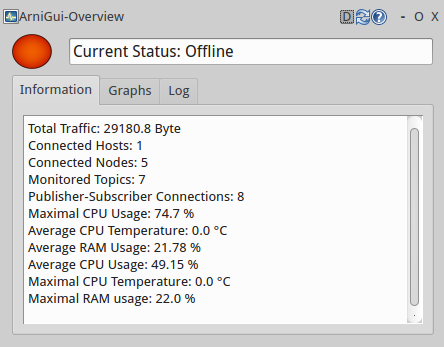| |
Setting up arni
Description: This tutorial will cover how to start arni and how to make sure it works correctly.Tutorial Level: INTERMEDIATE
Next Tutorial: creating specifications
Contents
Enabling statistics
Run the init launch file. It will amongst others set /enable_statistics to true and minimizes the statistic window size to get statistics published more frequently.
roslaunch arni_core init_params.launch
Simply starting roscore will also work but remember to load init_params otherwise the GUI may stay empty!
Statistics will now be automatically collected on all hosts that support it (only ROS versions newer than Indigo and even). Contrary to host / node statistics no additional components need to be started since ROS nodes support this out of the box.
Starting some publisher and subscriber
Start one publisher and one subscriber:
rosrun roscpp_tutorials listener rosrun roscpp_tutorials talker
Having a look
Running:
$ rostopic echo /statistics | grep / topic: /chatter node_pub: /talker node_sub: /listener
Will reveal that statistics about connections getting published on /statistics.
Enable statistics for hosts and nodes
Statistics for a host and nodes running on that host can be created by running:
rosrun arni_nodeinterface arni_nodeinterface
Launching the Topic Monitor (in rqt_gui) will reveal two new topics: /statistics_host and /statistics_node. Statistics about hosts / nodes as processes will be published on them.

This nodeinterface has to be started on any host where host / node information shall be collected. Furthermore it enables the automated execution of reactions on the according host.
Start arni GUI
Open rqt, in the menu open Plugins->Introspection->Arni-Overview. It will say offline to indicate that processing is not running. This will be fixed in the next chapter. Make sure that at least one host is connected according to this GUI.

Now arni should be up and running. Having learned the basics we can now proceed to creating specifications.







